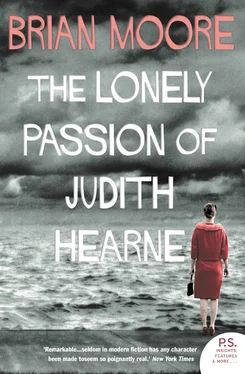So she smiled at Mary and was introduced by Mrs Henry Rice. The hammer was given into her hands and she fumbled with it, saying thank you, and that she would return it as soon as she had finished hanging her picture. Mrs Henry Rice said there was no hurry and to let them know if she needed anything else, and then Miss Hearne went back up the two flights of stairs to her room.
She found a picture hook and began to nail the Sacred Heart over the head of the bed. And then, thinking back on the people downstairs, it occurred to her that while Bernard Rice was interesting in a horrible sort of way, he was also creepy-crawly and the sort of person a woman would have to look out for. He looked nosey and she felt sure he was the sort of slyboots who would love prying into other people’s affairs. And saying the worst thing he could about what he found. Instinctively, she looked at her trunks and saw that they were locked. Just keep them that way, she told herself. I wouldn’t put it past him to creep in here some day when I’m out. Still, his mother is certainly friendly, if a little soft where her darling boy is concerned. And the fire and the tea were nice and warming.
She stood back and surveyed the Sacred Heart. Prayers, she must say later. Meanwhile, she drew the curtains and lit the gas stove. With the electric light on and the gas stove spluttering, warming the white bones of its mantles into a rosy red, the new bed-sitting-room became much more cheerful. Miss Hearne felt quite satisfied after her cup of tea and biscuit, so, after unpacking some more of her things, she laid her flannel nightgown on the bed and turned the covers down. It had all gone very well really, and the cab driver had looked quite happy with the shilling she gave him for carrying the trunks upstairs. It should have been more, but he hadn’t said anything nasty. And that was the main thing. She was moved in, she had chatted with the landlady and as a bonus, she had a couple of interesting stories to tell. The one about Father Quigley was not for mixed company, but it was certainly interesting. She decided to discard Bernard’s ending. It just wasn’t suitable and spoiled the whole point. And then there was Mrs Henry Rice and Bernard himself. They’d be something to talk about. Maybe some of the young O’Neills knew Bernard if he had been at Queen’s.
Miss Hearne unpacked the little travelling clock which had come all the way from Paris as a gift to her dear aunt. It was only seven, too early to go to bed. But she was tired and tomorrow was Friday, with nothing to do but unpack. Besides, if she went to sleep soon, she wouldn’t need any supper.
She put the clock on the bed-table and switched on the little bed lamp. Then she undressed and knelt to say her prayers. Afterwards, she lay between the covers in the strange bed, watching the shadows of the new room. When the reddened mantles of the stove had cooled to whiteness and the chill of the night made goose-pimples on her forearms outside the covers, she looked over at her dear aunt and then turned her head to look up at the Sacred Heart. She said good night to them both, then switched off the bed light and lay, snuggled in, with only her nose and eyes out of the covers, remembering that both of them were there in the darkness. They make all the difference, Miss Hearne thought, no matter what aunt was like at the end. When they’re with me, watching over me, a new place becomes home.
Her eyes, opening, saw the ceiling, the frozen light of what day? Sight, preceding comprehension, mercifully recorded familiar objects in the strangeness of the whole. Led the blind mind to memory; to this awakening.
She sat up, her hair falling around her shoulders, feeling a gelid draught through the flannel stuff of her nightgown. Her thighs and calves, warmed in the moist snuggle of sheets, were still lax, weary, asleep. The gilded face of her little travelling clock said ten past seven. She lay back, pulling the yellow blankets up to her chin and looked at the room.
A chair, broadbeamed, straight-backed, sat in the alcove by the bay window, an old pensioner staring out at the street. Near the bed, a dressing-table, made familiar by her bottle of cologne, her combs and brushes and her little round box of rouge. Across the worn carpet was a wardrobe of brown varnished wood with a long panel mirror set in its door. She looked in the mirror and saw the end of her bed, the small commotion of her feet ruffling the smooth tucked blankets. The wardrobe was ornamented with whorls and loops and on either side of the door mirror was a circle of light-coloured wood. The circles seemed to her like eyes, mournful wooden eyes on either side of the reflecting mirror nose. She looked away from those eyes to the white marble mantelpiece, cracked down one support, with its brass fender of Arabic design. Her Aunt D’Arcy said good day in silver and sepia-toned arrogance from the exact centre of this arrangement, while beside the gas fire a sagging, green-covered armchair waited its human burden. The carpet below the mantelpiece was worn to brown fibre threads. She hurried on, passing over the small wash-basin, the bed-table with its green lamp, to reach the reassurance of her two big trunks, blacktopped, brass-bound, ready to travel.
She twisted around and unhooked the heavy wool dressing-gown from the bedpost. Put it on her shoulders and slid her feet out of bed into blue, fleecy slippers. Cold, a cold room. She went quickly to the gas fire and turned it on, hearing its startled plop as the match poked it into life. She spread her underthings to warm; then fled back across the worn carpet to bed. Fifteen minutes, she said, it will take fifteen minutes to heat the place at all.
There was no hurry. Friday, a dull day, a day with nothing at all to do. Although it would be interesting at breakfast to see what sort of food Mrs Henry Rice gave and who the others were. She lay abed twenty minutes, then washed in cold water and went shivering to the mean heat of the stove. She slipped on her underthings under the concealing envelope of her nightgown, a habit picked up at the Sacred Heart convent in Armagh and retained, although keeping warm had long supplanted the original motive of modesty, which occasioned the fumblings, the exertions and the slowness of the manoeuvre. When she finally pulled the nightgown over her head, she was fully dressed, except for the dress itself. It was time for her morning hair-brushing exercise. She set great store by it: it kept one’s hair dark, she said, and if you did not wash the hair, ever, it kept its sheen and colour. Her hair, visible proof, was dark brown with a fine thickness and smooth lustre.
So each morning it was her custom to sit conscientiously at the mirror, her head bent to one side, tugging the brush along the thick rope of her hair, counting the strokes, thinking of nothing except the act of doing the exercise, her head jerking slightly with each long, strong stroke of the brush.
But this morning, hair brushing actually had to be hurried because it would never do to be late one’s first morning in a new place. Especially when there were other boarders to meet. She had said three, Mrs Henry Rice, were they men or women? Maybe, most likely, men, and what if one were charming?
Her angular face smiled softly at its glassy image. Her gaze, deceiving, transforming her to her imaginings, changed the contour of her sallow-skinned face, skilfully refashioning her long pointed nose on which a small chilly tear had gathered. Her dark eyes, eyes which skittered constantly in imagined fright, became wide, soft, luminous. Her frame, plain as a cheap clothes-rack, filled now with soft curves, developing a delicate line to the bosom.
She watched the glass, a plain woman, changing all to the delightful illusion of beauty. There was still time: for her ugliness was destined to bloom late, hidden first by the unformed gawkiness of youth, budding to plainness in young womanhood and now flowering to slow maturity in her early forties, it still awaited the subtle garishness which only decay could bring to fruition: a garishness which, when arrived at, would preclude all efforts at the mirror game.
Читать дальше












